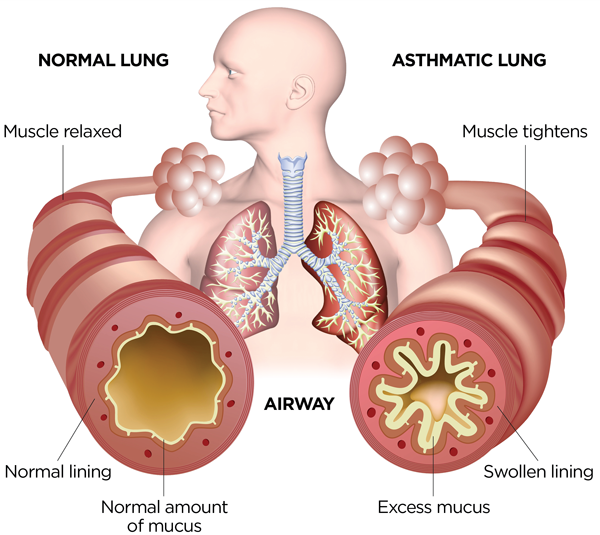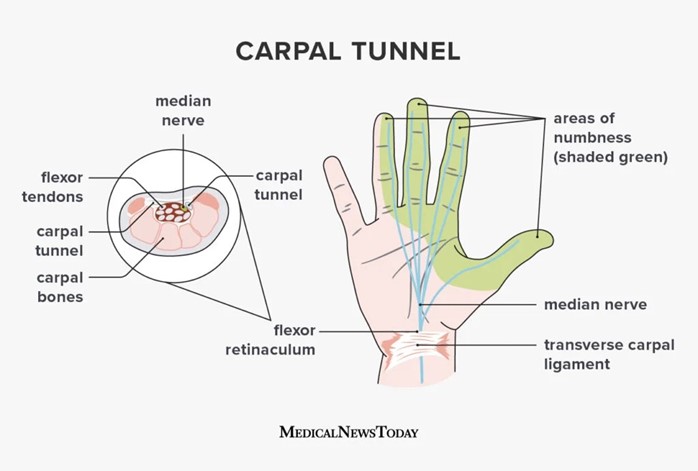A community health nurse is conducting an educational program on various environmental pollutants. The nurse should emphasize that clients who have which of the following disorders are especially vulnerable to ozone effects?
Mitral valve disease
Asthma
Nasal polyps
Seasonal allergies
The Correct Answer is B
Choice A reason: Mitral valve disease is not a disorder that makes clients especially vulnerable to ozone effects, as it does not affect the respiratory system. Mitral valve disease is a condition that affects the mitral valve, which is the valve that separates the left atrium and the left ventricle of the heart. Mitral valve disease can cause the valve to become narrow (stenosis) or leaky (regurgitation), affecting the blood flow and oxygen delivery to the body. Mitral valve disease can cause symptoms such as shortness of breath, fatigue, chest pain, palpitations, and swelling of the legs.
Choice B reason: Asthma is a disorder that makes clients especially vulnerable to ozone effects, as it affects the respiratory system. Asthma is a chronic inflammatory condition that causes the airways to become narrow, swollen, and sensitive to triggers such as allergens, irritants, infections, or exercise. Asthma can cause symptoms such as wheezing, coughing, chest tightness, and difficulty breathing. Ozone is a gas that is formed when sunlight reacts with pollutants in the air. Ozone can irritate the lungs and worsen asthma symptoms by causing inflammation, bronchoconstriction, and mucus production. Ozone can also reduce lung function and increase the risk of respiratory infections.
Choice C reason: Nasal polyps are not a disorder that makes clients especially vulnerable to ozone effects, as they do not affect the respiratory system. Nasal polyps are benign growths that form in the lining of the nose or sinuses. Nasal polyps can cause symptoms such as nasal congestion, runny nose, postnasal drip, loss of smell or taste, headache, and snoring. Nasal polyps are usually associated with chronic inflammation or allergies, but their exact cause is unknown.
Choice D reason: Seasonal allergies are not a disorder that makes clients especially vulnerable to ozone effects, as they do not affect the respiratory system. Seasonal allergies are allergic reactions that occur during certain times of the year when pollen or mold spores are high in the air. Seasonal allergies can cause symptoms such as sneezing, itching, watery eyes, runny nose, and sore throat. Seasonal allergies are caused by an overreaction of the immune system to harmless substances in the environment.

Nursing Test Bank
Naxlex Comprehensive Predictor Exams
Related Questions
Correct Answer is B
Explanation
Choice A reason: Giving care with a focus on the aggregate's needs is not the best description of client-focused community-based nursing, as it implies that the nurse is providing care to a population or a group of individuals who share some common characteristics or risk factors. This is more aligned with the concept of population-focused community-based nursing, which aims to improve the health outcomes of a defined group of people.
Choice B reason: A philosophy that guides family-centered illness care is the best description of client-focused community-based nursing, as it reflects the core values and principles of this approach. Client-focused community-based nursing is a model of care that emphasizes the individual and family as the unit of care, rather than the disease or the health problem. It involves collaborating with the client and family to identify their needs, preferences, strengths, and resources, and providing holistic, culturally sensitive, and evidence-based care that promotes health, wellness, and quality of life.
Choice C reason: Providing care with a focus on the group's needs is not the best description of client-focused community-based nursing, as it suggests that the nurse is providing care to a collective or a social unit that shares some common goals or interests. This is more aligned with the concept of community-oriented community-based nursing, which aims to improve the health status of a specific community or subpopulation.
Choice D reason: A value system in which all clients receive optimal care is not the best description of client-focused community-based nursing, as it does not capture the essence or uniqueness of this approach. While it is true that client-focused community-based nursing strives to provide high-quality care to all clients, it also recognizes that each client and family has different needs, preferences, and expectations that require individualized and tailored interventions.
Correct Answer is B
Explanation
Choice A: Collaborate with a physical therapist to develop programs for injured employees to return to work. This is incorrect because this is a tertiary prevention strategy, not a secondary prevention strategy. Tertiary prevention aims to restore function and prevent disability or complications after an injury or illness has occurred.
Choice B: Help plant workers identify signs of carpal tunnel syndrome. This is correct because this is a secondary prevention strategy. Secondary prevention aims to detect and treat health problems early before they become more serious or chronic. Carpal tunnel syndrome is a common occupational health problem that can cause pain, numbness, and weakness in the hand and wrist. Early identification and treatment can prevent permanent nerve damage and disability.
Choice C: Organize an influenza immunization campaign. This is incorrect because this is a primary prevention strategy, not a secondary prevention strategy. Primary prevention aims to prevent disease or injury from occurring in the first place, by reducing exposure or risk factors. Influenza immunization can protect plant workers from getting infected by the flu virus and reduce the spread of the disease.
Choice D: Teach plant workers about proper lifting techniques. This is incorrect because this is also a primary prevention strategy, not a secondary prevention strategy. Proper lifting techniques can prevent musculoskeletal injuries such as sprains, strains, and herniated discs, by avoiding excessive stress on the spine and joints.

Whether you are a student looking to ace your exams or a practicing nurse seeking to enhance your expertise , our nursing education contents will empower you with the confidence and competence to make a difference in the lives of patients and become a respected leader in the healthcare field.
Visit Naxlex, invest in your future and unlock endless possibilities with our unparalleled nursing education contents today
Report Wrong Answer on the Current Question
Do you disagree with the answer? If yes, what is your expected answer? Explain.
Kindly be descriptive with the issue you are facing.
